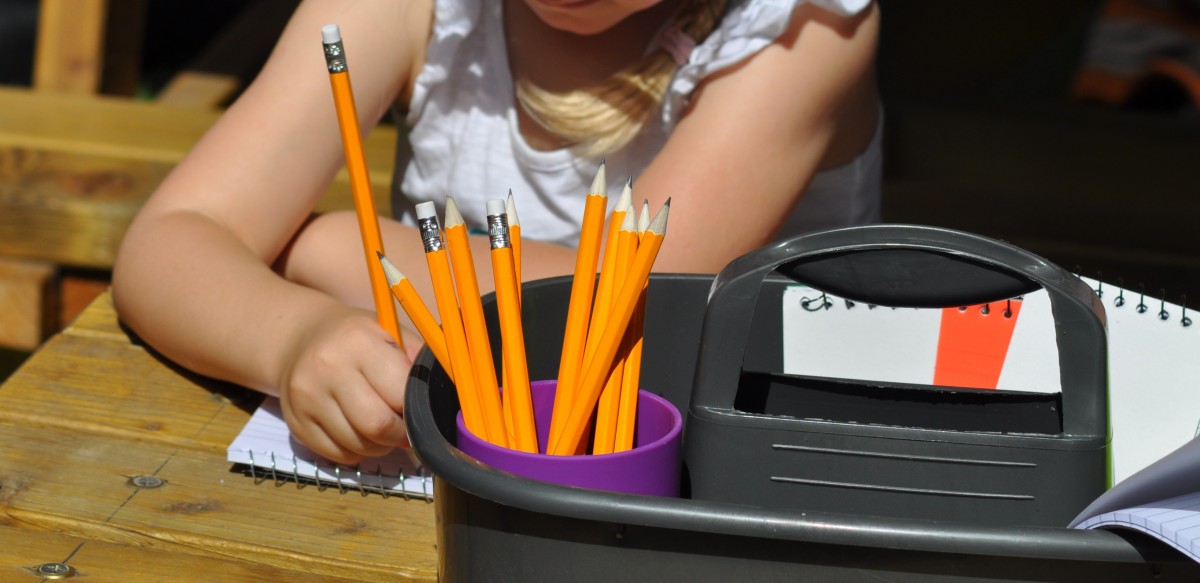An outdoor classroom is a valuable resource and can provide a range of benefits to the children’s development.
The outdoor classroom is a crucial learning environment, enabling some learning to take place that simply does not inside. It is a good idea to allow free flow from the indoors to the outside environment for the children to access; this will support children to play where they feel most comfortable and change their surroundings with ease. The outdoor area should reflect the same areas as inside, supporting children to develop and learn across all areas of the EYFS.
Expressive Arts and Design
There are many activities that can be offered outside to encourage this area of learning. A mark making shed is a great way for the children to access creative materials in the outdoor area. Notepads, pencils, pens, postcards, rulers and post it notes are all easy resources that can develop the children’s mark making skills.
Painting is another lovely activity that can be offered outside using colourful paints and a free standing easel or even letting the children paint the walls and floors with paintbrushes and water. The children will love creating pictures using the brushes and talking about them. The outdoor classroom offers the opportunity for children to paint on a variety of surfaces rather than just one.
Understanding The World
Children love to investigate and explore their surroundings. Creating a small world area in the outside environment will support these skills and build on children’s imaginative development. A dinosaur small world tray is easy to make and only requires artificial grass, some small wooden hamster houses and a handful of plastic dinosaurs. You can adapt the resources to suit the needs of the children, for example compost and sawdust makes a great sensory feel for a dinosaur world.
Bug hotels are another great resource to support investigation skills. The children can explore the hotel, looking for mini beasts and talk about what they have found in the natural habitat. This activity can be enhanced offering magnifying glasses and clear pots for the children to use to observe the bugs more closely.
Literacy
A quiet book area is a great addition to an outdoor classroom. The outside environment can often be fast paced and energetic; however children will still require space to calm down, reflect and observe. Children can relax in an outdoor story area, looking at a variety of story books and talking about the pictures with their friends.
Communication and Language
Musical instruments are a great way to develop attention and listening skills in children. They can be used as part of a game or during songs and stories. Taking the instruments outside can enhance an outdoor classroom. The children will experience a range of different sounds in the outdoor area, with a large open area making the sounds change.
The children’s communication and language development will also benefit from the use of a mud kitchen. Offering a variety of different sized mixing bowls, wooden spoons and cooking equipment enables the children to act out scenarios and interact with one another during the role play. This type of play supports children in building relationships and developing conversational skills.
Physical development
Physical development can benefit from regular access to the outdoor environment. Bikes are a common way of developing physical skills in children, using a wide range of gross motor movements to manoeuvre around obstacles. The bikes can also offer a variety of other activities for the children to enjoy. Creating a ‘car wash’ is a lovely way to get the children up and about but still involving the bikes. The children can take it in turns to ride the bikes up to a car wash area then wash the bikes using soapy water and sponges.
Personal, Social and Emotional Development
The outdoors is a lovely environment to encourage social development. There are lots of things to see, hear, smell and touch that ignites questions and conversations to happen. An outdoor classroom can offer opportunities to build on relationships and support children in learning about themselves and others. Puppets can give children the ability to express themselves using a doll and try out a range of social cues without direct consequences for their actions. Taking the puppets outside can open up a range of opportunities for the children to explore the natural environment.
Mathematics
Water play is a great way for children to develop their mathematical skills. Different sized bottles and containers can encourage children to experiment with measuring and simple mathematical language. Children will use their imagination and pretend to be making tea or mixing potions whilst playing with the water.
Puzzles outside also enable children to develop their shape, space and measure knowledge. The children will enjoy completing the puzzles, encouraging them to talk about the shapes in the environment. The children may look for materials outside that fit into their puzzle boards too. This activity also offer the opportunity for some rest, as children will spend a great deal of time being active outside. It is important to remember to include quiet, calming activities too.
Could you use these ideas to create an outdoor classroom in your setting? You can find more ideas here.
